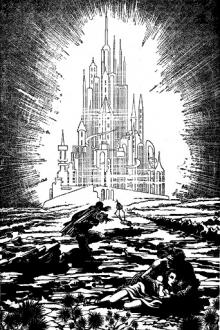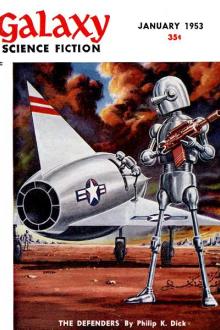Short Fiction - Philip K. Dick (100 books to read in a lifetime TXT) 📗

- Author: Philip K. Dick
Book online «Short Fiction - Philip K. Dick (100 books to read in a lifetime TXT) 📗». Author Philip K. Dick
And then the first claws appeared. And overnight the complexion of the war changed.
The claws were awkward, at first. Slow. The Ivans knocked them off almost as fast as they crawled out of their underground tunnels. But then they got better, faster and more cunning. Factories, all on Terra, turned them out. Factories a long way under ground, behind the Soviet lines, factories that had once made atomic projectiles, now almost forgotten.
The claws got faster, and they got bigger. New types appeared, some with feelers, some that flew. There were a few jumping kinds.
The best technicians on the moon were working on designs, making them more and more intricate, more flexible. They became uncanny; the Ivans were having a lot of trouble with them. Some of the little claws were learning to hide themselves, burrowing down into the ash, lying in wait.
And then they started getting into the Russian bunkers, slipping down when the lids were raised for air and a look around. One claw inside a bunker, a churning sphere of blades and metal—that was enough. And when one got in others followed. With a weapon like that the war couldn’t go on much longer.
Maybe it was already over.
Maybe he was going to hear the news. Maybe the Politburo had decided to throw in the sponge. Too bad it had taken so long. Six years. A long time for war like that, the way they had waged it. The automatic retaliation discs, spinning down all over Russia, hundreds of thousands of them. Bacteria crystals. The Soviet guided missiles, whistling through the air. The chain bombs. And now this, the robots, the claws—
The claws weren’t like other weapons. They were alive, from any practical standpoint, whether the Governments wanted to admit it or not. They were not machines. They were living things, spinning, creeping, shaking themselves up suddenly from the gray ash and darting toward a man, climbing up him, rushing for his throat. And that was what they had been designed to do. Their job.
They did their job well. Especially lately, with the new designs coming up. Now they repaired themselves. They were on their own. Radiation tabs protected the U.N. troops, but if a man lost his tab he was fair game for the claws, no matter what his uniform. Down below the surface automatic machinery stamped them out. Human beings stayed a long way off. It was too risky; nobody wanted to be around them. They were left to themselves. And they seemed to be doing all right. The new designs were faster, more complex. More efficient.
Apparently they had won the war.
Major Hendricks lit a second cigarette. The landscape depressed him. Nothing but ash and ruins. He seemed to be alone, the only living thing in the whole world. To the right the ruins of a town rose up, a few walls and heaps of debris. He tossed the dead match away, increasing his pace. Suddenly he stopped, jerking up his gun, his body tense. For a minute it looked like—
From behind the shell of a ruined building a figure came, walking slowly toward him, walking hesitantly.
Hendricks blinked. “Stop!”
The boy stopped. Hendricks lowered his gun. The boy stood silently, looking at him. He was small, not very old. Perhaps eight. But it was hard to tell. Most of the kids who remained were stunted. He wore a faded blue sweater, ragged with dirt, and short pants. His hair was long and matted. Brown hair. It hung over his face and around his ears. He held something in his arms.
“What’s that you have?” Hendricks said sharply.
The boy held it out. It was a toy, a bear. A teddy bear. The boy’s eyes were large, but without expression.
Hendricks relaxed. “I don’t want it. Keep it.”
The boy hugged the bear again.
“Where do you live?” Hendricks said.
“In there.”
“The ruins?”
“Yes.”
“Underground?”
“Yes.”
“How many are there?”
“How—how many?”
“How many of you. How big’s your settlement?”
The boy did not answer.
Hendricks frowned. “You’re not all by yourself, are you?”
The boy nodded.
“How do you stay alive?”
“There’s food.”
“What kind of food?”
“Different.”
Hendricks studied him. “How old are you?”
“Thirteen.”
It wasn’t possible. Or was it? The boy was thin, stunted. And probably sterile. Radiation exposure, years straight. No wonder he was so small. His arms and legs were like pipe cleaners, knobby, and thin. Hendricks touched the boy’s arm. His skin was dry and rough; radiation skin. He bent down, looking into the boy’s face. There was no expression. Big eyes, big and dark.
“Are you blind?” Hendricks said.
“No. I can see some.”
“How do you get away from the claws?”
“The claws?”
“The round things. That run and burrow.”
“I don’t understand.”
Maybe there weren’t any claws around. A lot of areas were free. They collected mostly around bunkers, where there were people. The claws had been designed to sense warmth, warmth of living things.
“You’re lucky.” Hendricks straightened up. “Well? Which way are you going? Back—back there?”
“Can I come with you?”
“With me?” Hendricks folded his arms. “I’m going a long way. Miles. I have to hurry.” He looked at his watch. “I have to get there by nightfall.”
“I want to come.”
Hendricks fumbled in his pack. “It isn’t worth it. Here.” He tossed down the food cans he had with him. “You take these and go back. Okay?”
The boy said nothing.
“I’ll be coming back this way. In a day or so. If you’re around here when I come back you can come along with me. All right?”
“I want to go with you now.”
“It’s a long walk.”
“I can walk.”
Hendricks shifted uneasily. It made too good a target, two people walking along. And the boy would slow him down. But he might not come back this way. And if the boy were really all





Comments (0)